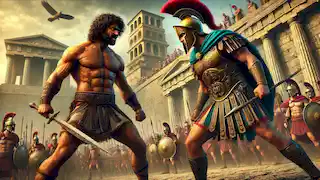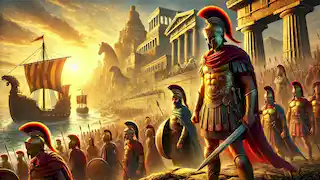In the ancient lands of Greece, where the gods and mortals often intertwined, there arose a conflict so grand that it would echo through the ages as the legendary Trojan War. This epic tale of heroism, betrayal, love, and vengeance centers on the fateful battle over the city of Troy. The story involves formidable warriors, cunning strategies, and divine interventions that shape its destiny. As we journey into this world, we uncover the origins of the war, the great heroes who fought in it, and the sorrow that it wrought upon both victors and vanquished alike. The spark that ignited the Trojan War began at a wedding on Mount Olympus. Peleus, a mortal hero, and Thetis, a sea nymph, were to be married, and the gods had all gathered to celebrate. However, Eris, the goddess of discord, was not invited. Enraged by the slight, Eris threw a golden apple inscribed with the words, “To the fairest,” into the midst of the feast. Three goddesses—Hera, Athena, and Aphrodite—claimed the apple as their own, and none would yield. To settle the dispute, Zeus, the king of the gods, appointed Paris, the prince of Troy, to judge who among the three was the fairest. Each goddess promised Paris a reward for choosing her. Hera offered power, Athena promised wisdom and skill in battle, and Aphrodite whispered promises of the most beautiful woman in the world as his bride. Paris, captivated by Aphrodite's offer, awarded the golden apple to her, sealing the fate of Troy. The most beautiful woman in the world was Helen, wife of Menelaus, king of Sparta. Aphrodite’s reward led Paris to Sparta, where he was warmly welcomed by Menelaus and Helen. But under Aphrodite's spell, Helen fell in love with Paris and fled with him to Troy, leaving behind her husband, child, and homeland. The Greeks viewed this act as a grievous insult, not only to Menelaus but to all of Greece. They saw it as their duty to reclaim Helen and restore honor. Menelaus, distraught and enraged, turned to his brother Agamemnon, king of Mycenae, for support. Together, they called upon all the Greek kings and heroes who had once pledged to protect Helen. Thus, the greatest warriors of Greece gathered: Achilles, the greatest of them all; Odysseus, known for his cunning; Ajax, the towering fighter; and many others. Each was bound by an oath and a shared sense of honor to reclaim Helen and punish Troy. A fleet of a thousand ships set sail, carrying the Greek forces across the Aegean Sea. However, their journey was not easy. Artemis, the goddess of the hunt, had been angered by Agamemnon, and as punishment, she sent strong winds to halt their journey. To appease the goddess, Agamemnon made a heart-wrenching decision—he sacrificed his own daughter, Iphigenia. Only then did the winds change, allowing the Greeks to reach the shores of Troy. The Greeks laid siege to the city of Troy, a stronghold with towering walls built by the gods themselves. For nine long years, both sides fought valiantly, with neither gaining a decisive victory. The Trojans, led by their noble prince Hector, defended their city with courage and skill, while the Greeks, led by heroes such as Achilles, struck fear into the hearts of their enemies. Achilles was the mightiest of the Greek warriors, yet his pride and temper often led him into conflict with his own allies. During the war, he clashed with Agamemnon over a captive woman, Briseis. Furious at the insult, Achilles withdrew from battle, leaving the Greeks vulnerable. The Trojans, led by Hector, took advantage of Achilles' absence, pushing the Greeks back to their ships. With his honor tarnished and his closest friend, Patroclus, killed by Hector while wearing his armor, Achilles' grief turned to wrath. He rejoined the battle, seeking revenge. In a fierce confrontation, he killed Hector, dragging his body behind his chariot in a display of his fury. This act shocked both Trojans and Greeks alike, revealing the destructive power of Achilles' rage. Though Achilles was nearly invincible, he was not immortal. His mother, Thetis, had dipped him in the River Styx as a child, making him impervious to harm except for his heel, where she had held him. This weakness was unknown to most, but Paris, guided by Apollo, struck Achilles' heel with an arrow, bringing down Greece’s greatest warrior. With Achilles gone, the Greeks faced a disheartening loss. They struggled to maintain their morale, but Odysseus, with his clever mind, devised a final strategy that would forever alter the course of the war. After years of fruitless siege, the Greeks appeared to abandon the war, leaving a massive wooden horse outside Troy’s gates as a supposed offering to the gods. The Trojans, believing the Greeks had given up, brought the horse inside the city as a symbol of their victory. That night, as the city celebrated, Greek soldiers hidden inside the horse emerged, opening Troy’s gates to the returning Greek army. The Greeks poured into the city, and chaos ensued. In one tragic night, Troy was sacked and burned, and its people either slaughtered or enslaved. The Trojan War had ended in a fiery destruction, fulfilling the dark prophecy that had long loomed over Troy. The war left scars on both the victors and the vanquished. The Greeks, though triumphant, faced their own trials on the journey home. Odysseus, in particular, would wander for ten years before finally reaching Ithaca, encountering mythical creatures and enduring hardships. The gods, displeased with the Greeks’ pride, punished many for their actions during the war. Even those who did reach home found their lives changed by the years of battle and loss. The Trojan War became a legend, a symbol of both the glory and the tragedy of human endeavor. It served as a cautionary tale about pride, vengeance, and the wrath of the gods. Through the stories of heroes like Achilles, Hector, and Odysseus, the ancient Greeks found models of bravery and warnings of hubris. The tale of Troy would endure, passed down through epic poems and songs. The poet Homer would immortalize the war in the Iliad and the Odyssey, capturing the valor and sorrow of those who fought and perished. Though the city of Troy lay in ruins, its story would resonate through history, its lessons studied and revered by generations. The Trojan War was not just a tale of conquest but a saga of human emotions, of love and rage, loyalty and betrayal. Even in its ruin, Troy left behind a legacy that shaped the culture and consciousness of the ancient world, reminding all of the fragility of human greatness and the enduring power of myth. In the end, the tale of the Trojan War remains a timeless epic that speaks to the triumphs and tribulations of the human spirit. It is a story that transcends the ages, with its themes of honor, revenge, and destiny resonating across cultures and centuries. In every retelling, the heroes of Greece and Troy rise once more, their voices echoing through the pages of history and the whispers of legend. As the ashes of Troy cooled, the gods observed from Olympus, each reflecting on the impact of their interventions. They saw the folly of their pride and their tendency to meddle in mortal affairs. Yet, even as they pondered, they knew that the cycle of conflict and passion would continue. For such is the nature of both gods and men—a desire for greatness, for love, and for revenge, woven into the very fabric of their existence. The Trojan War, thus, remains an epic tale, not only of war but of the enduring bonds of loyalty and the inevitable pull of fate.The Golden Apple and the Seeds of War
The Abduction of Helen
The Gathering of the Greek Armies
The Journey to Troy
The Siege of Troy
The Wrath of Achilles

The Death of Achilles
The Trojan Horse
The Aftermath of War
The Legacy of the Trojan War
The Triumph and Tragedy Remembered
Conclusion

Epilogue: The Gods' Reflection


The Tale of the Trojan War
Reading Time: 7 min

About Story: The Tale of the Trojan War is a Myth Stories from greece set in the Ancient Stories. This Dramatic Stories tale explores themes of Courage Stories and is suitable for All Ages Stories. It offers Cultural Stories insights. The legendary war that shaped ancient Greece, where heroes fought, gods meddled, and a city fell.


















